TOKYO – 6 August 2019: Lots of missed opportunities need to be reconsidered for further cooperation between Egypt and Japan in the near future. The two countries still have a lot of potential for joint coordination in several aspects.
Taking a closer look on Japan would make you re-think of it as more than just a technologically sophisticated country, and for Egypt, as more than a North African developing, and economically growing country.
Egypt, which is currently the head of the African Union, is looking for more discussions and solutions to several national and African issues, including the countries’ economic reform and growth as a priority.
Other issues including enhancing peace and security, countering terrorism, developing health, education and infrastructure are among the challenges that need a second look in Africa. That is in addition to poverty, forced displacement and illegal immigration.
What could Africa as a nation with all its particular challenges and priorities benefit from cooperating with Japan?
The policy of the “closed door” was forced in Japan for hundreds of years. Per this policy, very few things could have the opportunity to enter or leave the country. This affected the country’s trade, culture and military and led to the transformation of the country.
Many things happened during wars and conflicts, especially World War II,for which the country officially apologized. Years after all of this, Japan has become more than just technologically-advanced country;it is a country which is still seeking to learn, and communicate.
“Japan is an isolated country.It is far from Africa. It needs nearly a day of traveling so we can reach each other,” President of Japan International Cooperation Agency (JICA) Shinichi Kitaoka said during a meeting that included ten journalists from different African countries, reviewing the Japanese-African relations and the aspects of ongoing cooperation.
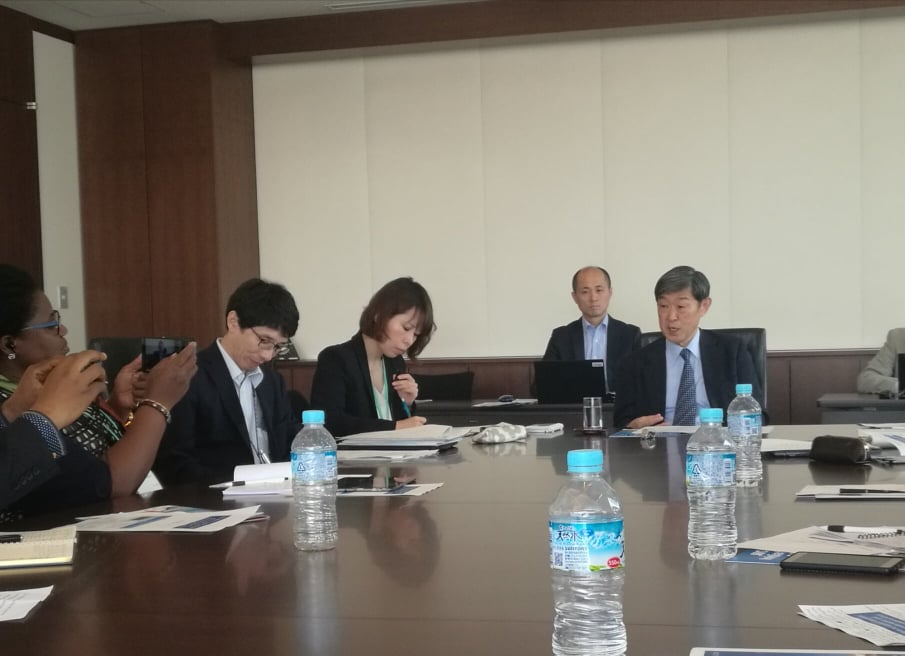 President of Japan International Cooperation Agency (JICA) Shinichi Kitaoka during meeting with group of 10 journalists from different African countries, July 2019- Egypt Today Aya Samir
President of Japan International Cooperation Agency (JICA) Shinichi Kitaoka during meeting with group of 10 journalists from different African countries, July 2019- Egypt Today Aya Samir
During the meeting,Kitaoka said that Japan supports other countries to grow and be independent through providing ODA loans. “Loan is something to support being independent. Countries need to know how to utilize these loans and give themback after several years,” Kitaoka explained.
“We made mistakes in World War II, invaded other Asian countries, so we wanted to give back to these countries, and this is what we did during the past years. However, as the Asian countries have developed, we think that Africa has to be the main focus of Japan at the meantime,” Kitaoka added.
, as a start
In 1993, Japan and Africa started holding Tokyo International Conference on African Development (TICAD). TICAD was held for the first time in Tokyo on October 5 and 6, 1993, aiming to enhance dialogue between African-Japanese leaders, promote Africa’s development, peace and security, strengthen relations between the countries, and establish strong partnerships between Tokyo and Africa.
The international conference which has been held regularly since then is not just led by Japan, despite being a Japanese initiative. Several international partners shared the organization of TICAD, which is co-sponsored by the United Nations, along with the Japanese government. The partners include the United Nations Development Programme (UNDP), the African Union Commission (AUC) and the World Bank.
On August 28, TICAD7 is expected to be held inthe presence of all African leaders, including Egypt’s President Abdel Fatah al-Sisi. Many things were announced to be discussed.
During meeting with JICA and Japan External Trade Organization (JETRO) officials in Tokyo in July, Business Today knew several details about the awaited conference including the side eventsbeing held for the first time with an Egyptian start up participation among other African startups invited to the conference.
Under the theme “Africa and Yokohama, Sharing Passion for the Future,” several issues are going to be discussed during the conference. Technology and innovation wereannounced to be part ofall discussions this year.
But, as discussions have been ongoing between Africa and Japan extensively since 1993, what else could be done, so no opportunities would be missed, especially between Egypt and Japan?
Start ups
Egypt is a rising market for startups. According to start-up platform MAGNiTT’s 2018 Mena Venture Investment Report, Egypt is the fastest growing startup ecosystem and the second largest after the UAE.
Egypt’s share of the total number of seed funding agreements grew by 7 percent y-o-y to $196.5 million, representing 22 percent of all MENA closes in 2018. “Egypt is seeing a second wave of entrepreneurs and investors that are more mature and experienced. The population is also starting to embrace technology for everyday activities,” Algebra Ventures Managing Partner Ziad Mokhtar said.
Accordingly, Egypt’s entrepreneurs could not just see golden opportunities during TICAD7, but also for what a city like Kobe could offer to them.
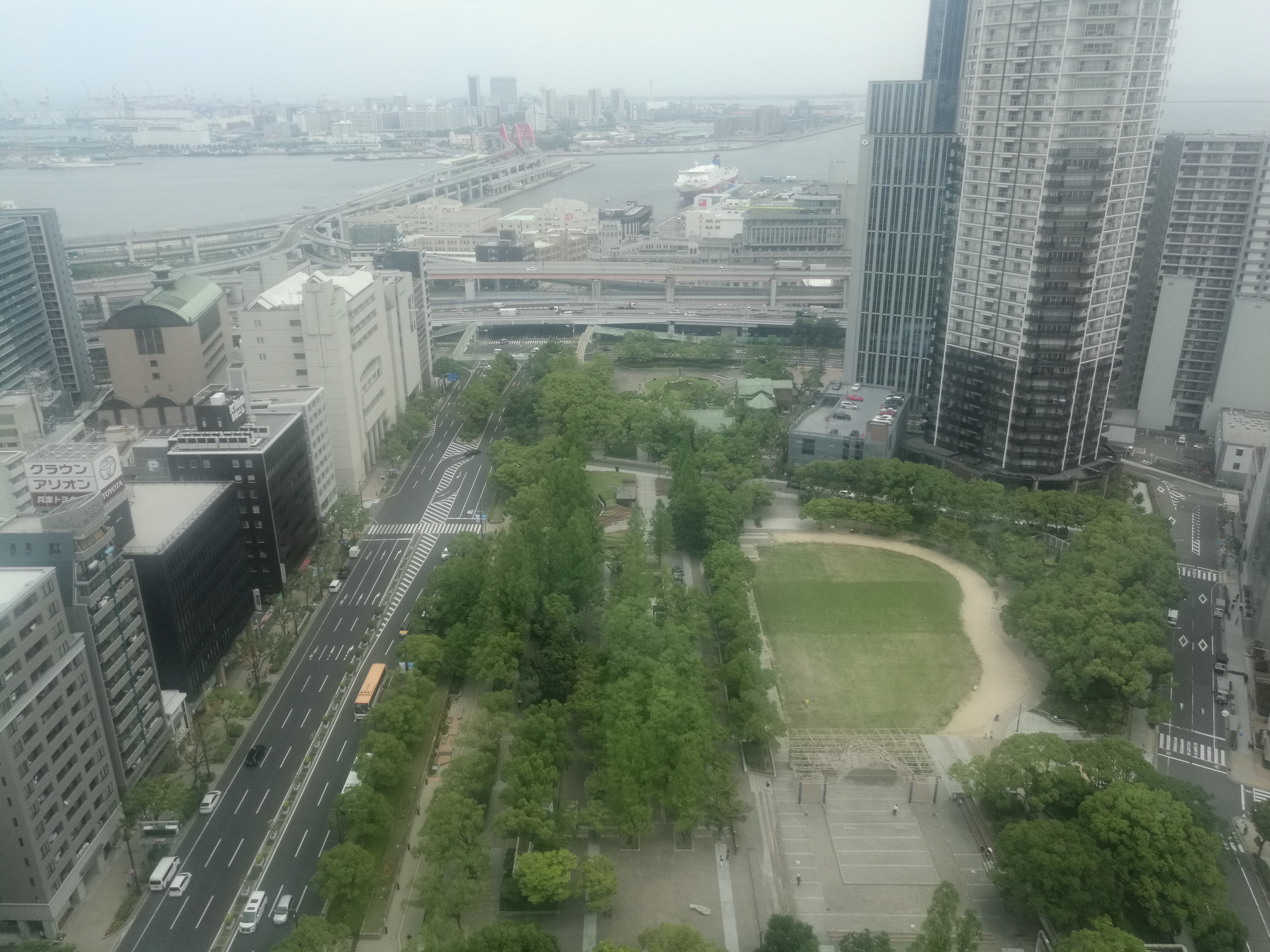 A landscape overview for Kobe city, July, 2019- Egypt Today Aya Samir
A landscape overview for Kobe city, July, 2019- Egypt Today Aya Samir
Kobe is a Japanese city promoting itself as the young people and innovators' first choice. During a presentation for Kobe officials at the city administrative headquarters, they focused on the city’s goal to become an environment where entrepreneurs can grow easily and create their new business.
The start-up visa for foreigners is among the very special things offered by Kobe city. Meeting with the city officials, they explained that they can offer a startup visa that allows foreign entrepreneurs to stay in Japan for one year maximum.
After getting the approval of the city officials, entrepreneurs will be able to start their business in Japan and enjoy a subsidy provided by the government “covering half of rent and communication cost, 2million ($1.8K) Yen personnel expenses for hi-tech engineersand a maximum of13 million ($120K) subsidies for 3years."
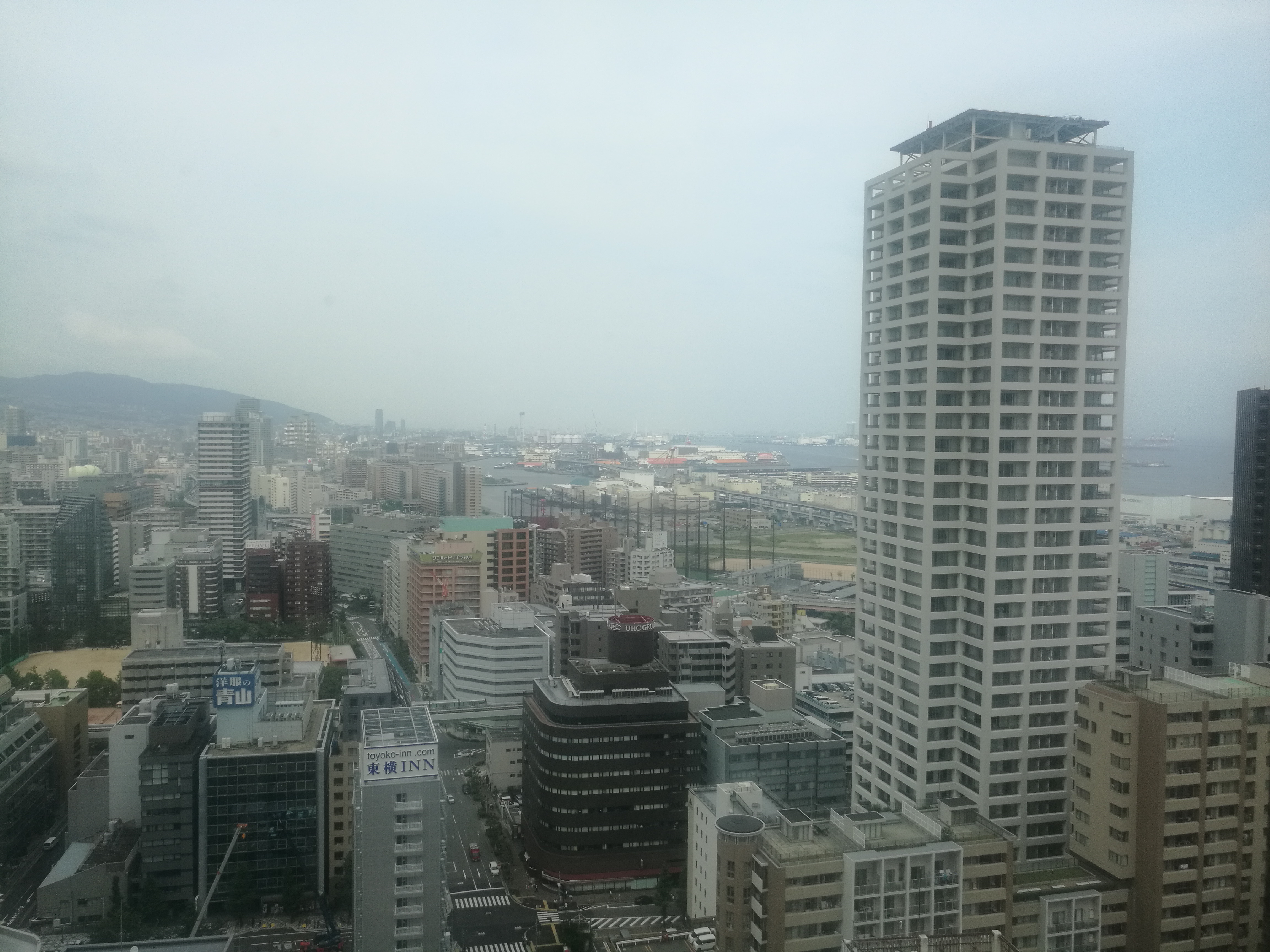 A landscape overview for Kobe city, July, 2019- Egypt Today Aya Samir
A landscape overview for Kobe city, July, 2019- Egypt Today Aya Samir
However, after the first year of operating in Japan, startups need to meet the city's demands to continue operating for further periods. The city’s criteria include the business has “a maximum of two full time staff or a capital exceeding 5 million Yen”.
This Japanese city is offering a start-up visa for entrepreneurs even if they do not have an existing business at their own countries. The officials affirmed to Business Today that no legal consequences will be imposed on the startups or the founders if they fail to meet the demands. They added that the Japanese perspective towards startups is different than the African one, and they believe that startups will have a fair chance in Japan to succeed and continue.
Age, health and society
The challenges in Japan and Egypt are severely different. Egypt deals with the high and rapidly growing population as a problem which is equally dangerous to terrorism, according to President Abdel Fatah al-Sisi's earlier statements. Japan is suffering from the rising number of elderly people and the reluctance of young people to marry and have children. According to statistics reviewed during a presentation at the National Hospital Organization, Nagasaki Medical Center, Japan in the future willsuffer population reduction.
Japan’s Ministry of Health is currently working to promote increasing the population, according to doctor Atsumasa Komori from Nagasaki Medical Center. “The increasing numberof elderly people in Japan is our biggest problem,” he said.
Enhancing communications between Japanese and African nations and increasing the cultural exchanging channels could offer a solution for both countries.
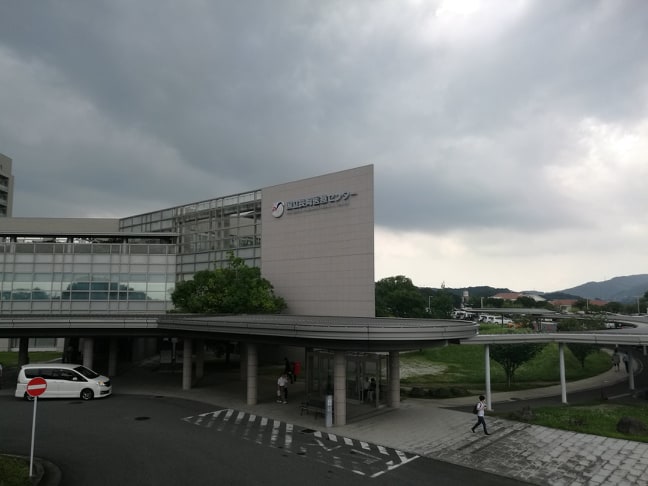 Nagasaki Medical Center, July 2019- Egypt Today Aya Samir
Nagasaki Medical Center, July 2019- Egypt Today Aya Samir
“Egypt’s steadily growing population should be used as a privilege,”JICA’s Middle East division Director Masataka TAKESHITA said during an interview with Business Today at JICA’s headquarters’ in Tokyo. He assured that the country’s population is one of the positive sides that should be exploited in the best ways.
He pointed out that Egypt still needs to work on creating more job opportunitiesamid the government's economic reforms.
Japan has many successful experiments on human development especially in Asia, according to Shigeru Ushio, director-general for African Affairs department and assistant minister offoreign affairs.
Egypt and Japan had a lot of meetings and discussions ahead of TICAD7, set to be held on August 28 in Yokohoma city, according to Ushio, who affirmed that both parties held a number of senior officials’ meetings.
He added that Japan has huge commitments with Egypt. "The Egyptian government always sends high level seniors to Japan to follow up on updates of our agreements and discussions and we respect their views and leadership," Ushio added.
He pointed out during a limited press conference held in the attendance of the African media representatives that Egypt and Japan held a lot of discussions, especially regarding human development aspects where Japan has a number of successful experiences in cooperation with other countries.
"We believe development is the key to do anything, as we have done this with many countries, especially in Asia, and believe that the time has come to do it with Africa now," Ushio stated
With Further discussions among officials in both countries, maybe Japan and Egypt can reach a solution for them both.
Agriculture
"I am interested in Delta. If there is a chance to conduct research and see what we can do in this area, we are certainly interested in it," Yasuhiro Tsujimoto, a member of the Crop, Livestock, and Environment division at Japan International Research Center for Agricultural Science (JIRACAS) told Business Today during a presentation at JIRACAS headquarters in Tsukuba.
Tsujimoto was reviewing his pilot project implemented in Madagascar since 2001. He said that the final results of his project, which aims at improving rice production in Africa, cannot be officially announced yet. He added, however, that if JIRACAS found that any of its research results are suitable with Egypt's agriculture conditions and climate, it will definitely share it.
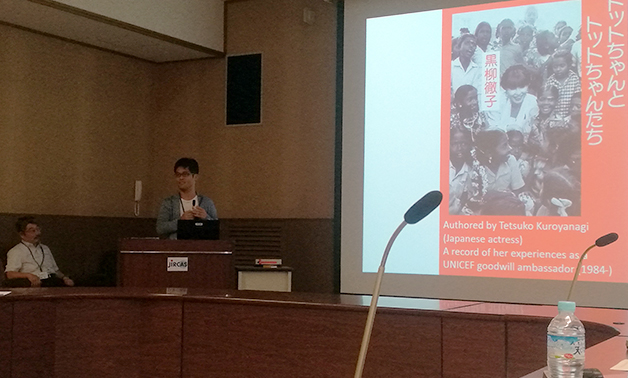 Yasuhiro TSUJIMOTO from JIRACAS Crop, Livestock, and Environment division during his Presentation July 3 at JIRACAS headquarters - EgyptToday/Aya Samir
Yasuhiro TSUJIMOTO from JIRACAS Crop, Livestock, and Environment division during his Presentation July 3 at JIRACAS headquarters - EgyptToday/Aya Samir
He also explained that his project, entitled "FY VARY project", aims at the improvement of rice yield production under law fertilizer input and poor soil fertility environment in SSA. It was mainly conducted as a pilot experiment in Madagascar, and is scheduled to continue until 2022.
Answering Business Today's question about JIRACAS' researches in North African countries, and especially Egypt, in order to raise the production rate and quality, Yasuhiro said the institute is not currently conducting research in North Africa, especially with the existence of a nearby universities and institutes interested in conducting researches on Egypt's climate and agriculture conditions.
"We are not conducting current research in North Africa, as other universes are doing research. We are focusing more on doing what no one else has done before, especially in other African countries," Yasuhiro said.
The Food and Agriculture Organization of the United Nations (FAO) published a research on rice production in Africa titled, "Rice production in Africa, current situation and issues". The study states that, "With the exception of a few countries that have attained self-sufficiency in rice production, rice demand exceeds production and large quantities of rice are imported to meet demand at a huge cost in hard currency."
According to a FAO study, Africa consumes a total of 11.6 million tons of milled rice per year, of which 3.3 million tons (33.6 percent) are imported.
Egypt, in particular, has imposed restrictions on planting rice since the beginning of 2018 due to fears of water shortage. The government has decided to reduce the area of rice cultivation from 1 million feddans to 724,000 feddans. Furthermore, planting rice was prohibited in certain governorates, including Aswan, Luxor, Qena, Sohag, Assiut, Minya, BeniSuef, Fayoum, New Valley, Giza, Cairo, Qaliubiya, Menoufia, MarsaMatrouh, North Sinai, South Sinai and Red Sea.
According to reports, Nigeria was named the largest producer of rice in Africa, replacing Egypt which was known of being on top of Africa's production in this regard.
In March 2019, Egypt's government has announced raising the allowed area of rice cultivation, to be once again 1 million feddans, in order to reduce the import expenses for rice.
Education
Egypt and Japan already have a "successful implemented experience" regarding educational cooperation, according to JICA's Egypt Office Chief Representative, Yoshifumi Omura, during an interview with Business Today.
Nearly 100 schools are to be opened during the several coming years. Some 35 schools have already opened their doors and received Egyptian students for the academic year 2018/2019. Five more schools are expected to open during the next year.
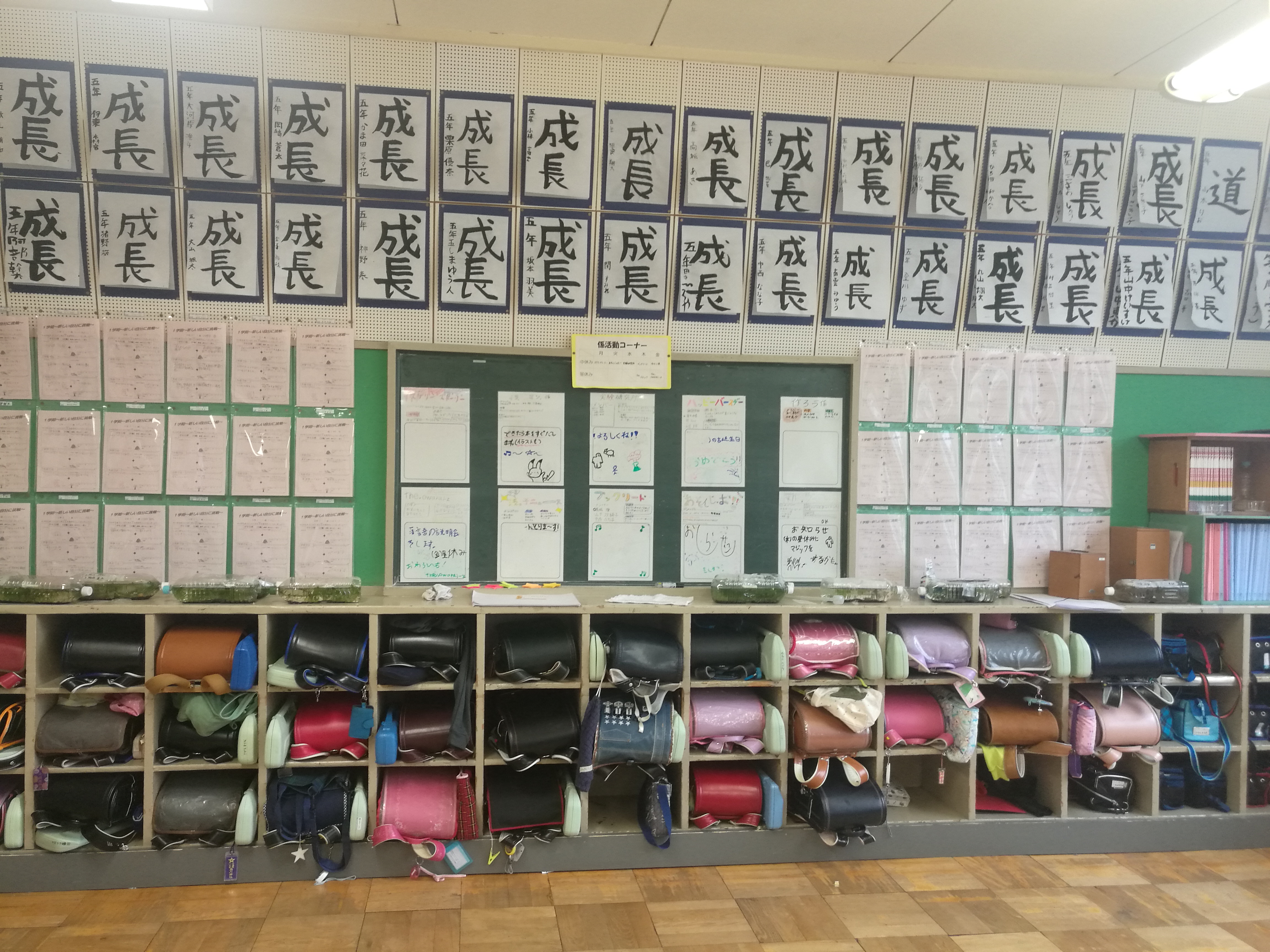 Asakawa elementary school, July 2019- Egypt Today Aya Samir
Asakawa elementary school, July 2019- Egypt Today Aya Samir
The 100 schools will be based on “Tokkatsu”. As identified by Japanese Asakawa elementary school principal, Ms. Hiromi Shimizu, Tokkatsu is a kind of student activity which builds the students’ characters to make them more independent and positive. She said that studies have been conducted on students’ behavior before and after applying the Tokkatsu activities, and showed significant transformation in students’ behaviors. Students turn into more engaging and open individuals who are willing to participate in discussions without fear.
Many Egyptian teachers came to Japan to take the Tokkatsu training, according to Shimizu. She added that she met and trained some of them, and even became friends with them.
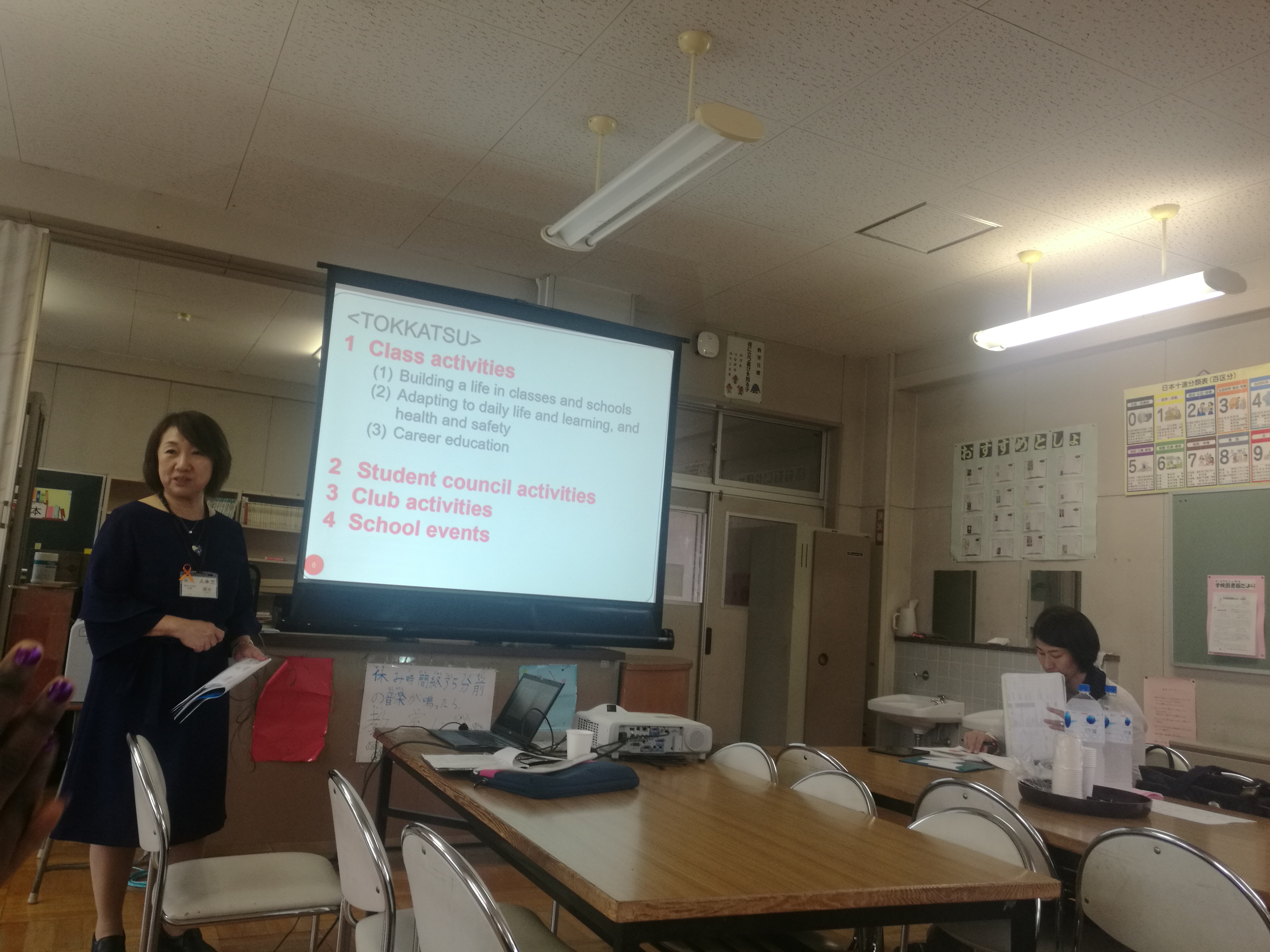 Asakawa elementary school Principal, Ms. Hiromi Shimizu during a presentation about Tokkatsu activity, July 2019- Egypt Today Aya Samir
Asakawa elementary school Principal, Ms. Hiromi Shimizu during a presentation about Tokkatsu activity, July 2019- Egypt Today Aya Samir
“We understand that we have an education system different from the one in Egypt, or any other country; however, Tokkatsu is not just about learning, it is also about building personalities,” Shimizu said.
By the end of the academic year, teachers will have to fill a form to check if all of the Tokkatsu goals have been achieved during the year. This is the only aspect through which they can check if Tokkatsu was successful or not.
“Tokkatsu can be applied anywhere around the world. Eventually, Tokkatsu is about changing people’s mind sets to be more motivated to participate in the society even more,” Shimizu said.
“Of course we expected to face some difficulties and problems in the beginning because the whole idea is new. But, so far, I can say that the experience is pretty much successful, despite everything that happened during setting up the process last year,” JICA's Egypt Office Chief Representative, Yoshifumi Omura, said.
Japan is not a country with so many natural sources; however, they managed to create different sources to strengthen their economy. JICA’s Kitaoka reviewed during the meeting with the African journalists that Japan focused after World War II on reforming the country’s economy. Several years later, Japan, a country which survived two atomic bombings, turned from an invading country during the war to a supporting country for its neighbors.
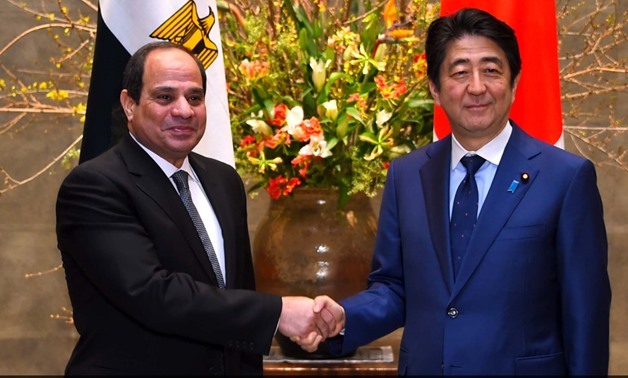







Comments
Leave a Comment